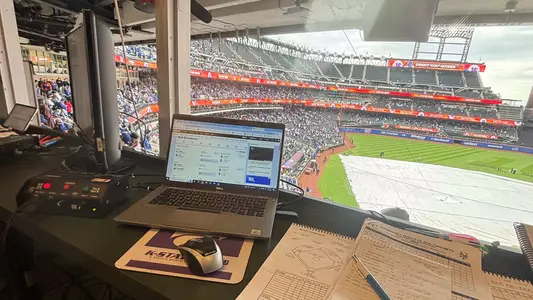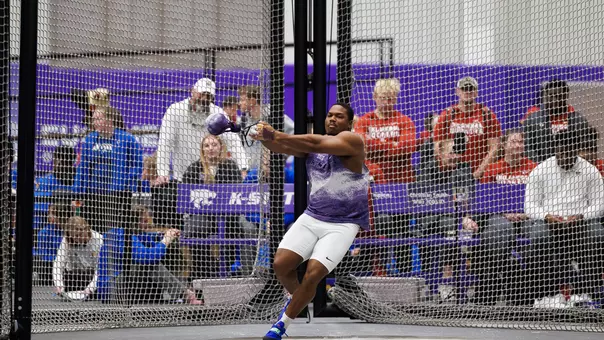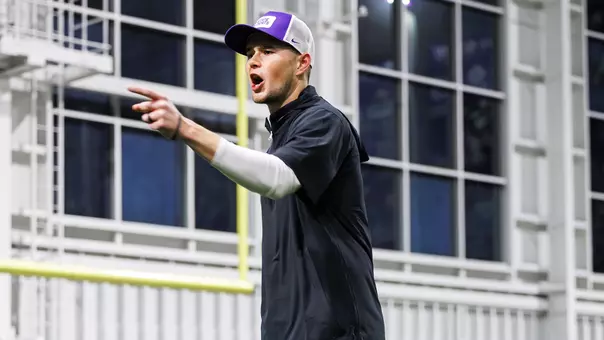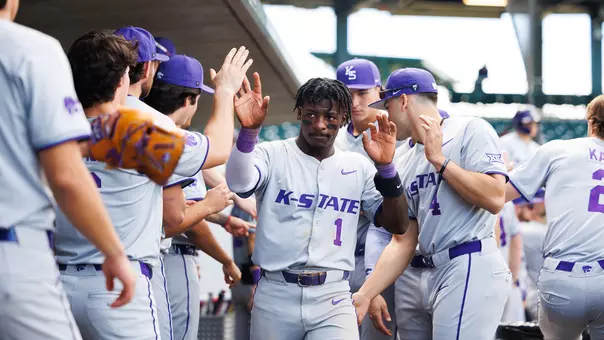
A Childhood Dream Come True
Apr 23, 2024 | Sports Extra, Athletics
By: D. Scott Fritchen
There's no crying in baseball, but happy tears are allowed, and that's what Hall of Famer Wyatt Thompson expressed while recounting his field-of-dreams experience in announcing a three-game series between the Kansas City Royals and the New York Mets at Citi Field in New York City earlier in April.
"From the time I was a little boy, I dreamed of announcing big league baseball," Thompson says. "I've been as lucky as anybody in this business."
Thompson relives his experience in living out a childhood dream while sitting in a Manhattan restaurant adorned with Kansas State memorabilia. Thompson, who was inducted into the Kansas Association of Broadcasters Hall of Fame in 2022, has called K-State games for 22 years, and over the course of his career has been named the Kansas Sportscaster of the Year six times.
But there was nothing quite like walking into the radio booth at Citi Field on April 12-14.
"Just walking in there knowing I'm going to be on the air for a few hours and do a Major League Baseball game, that was almost overwhelming, honestly," he says. "It was emotional."
Thompson spoke with K-State Sports Extra's D. Scott Fritchen about his remarkable experience:
D. Scott Fritchen: Where did the experience of calling a Royals game rank on your bucket list?
Wyatt Thompson: From the time I was a little boy, I dreamed of announcing big league baseball, so it'd be right toward the top. I've been as lucky as anybody in this business. I've been announcing at the Division I level since 1989, and I've had 22 years at K-State, and I've been to 23 bowl games now, and K-State has been to three Elite Eights since I've been here, but announcing for the Royals, this was a pretty special thing, and I loved every second of it. It was incredible. It's hard to even put into perspective how much fun it was. I told those guys after the broadcast on Sunday that if I never call another pitch in the big leagues, I've done three games now, and that's three more than I thought I was ever going to do. It's all gravy, right? It was an incredible experience.

Fritchen: How were you approached with this opportunity?
Thompson: Interesting story because the first guy to contact me was Sam Mellinger, who was a writer at the Kansas City Star and took over for Mike Swanson as the media relations director for the Royals. He called and asked if I'd be interested, and I told him, "I'd walk there." I said, "Yes, I'm interested." It was really great hearing from Sam, who offered and asked if I would have interest. That was a blast. That was cool. If I'm being honest, I thought, "Is this for real?" Not everybody gets a chance to do something like that at that level. Once it started to sink in that this was going to happen, it was good fortune there, for sure.
Fritchen: Can you describe walking into Citi Field and then the feeling of sitting in that radio announcer's chair for the first time?
Thompson: That's a really hard one to quantify. You dream about those types of things. Just walking in there knowing I'm going to be on the air for a few hours and do a Major League Baseball game, that was almost overwhelming, honestly. It was emotional. It was so many things. I do have to say that everybody with the Royals was so great. From the day I walked in there on Thursday, which was my observation day watching the Royals play the Astros at home, and then flying to New York, to watching them go Sunday onto Chicago while I stayed the night Sunday night and flew back from LaGuardia on Monday, from the GM to the manager to the coaches to the players to the broadcast crews, they couldn't have been better. My point to all of that is, it was an incredible experience, but it was made better by those people. I mean that sincerely. And the Mets were great, too. One thing that got to me on Sunday was they had a ceremony for Doc Gooden, the former pitcher, and they retired his number. He was the ninth number retired. There were three other Mets who'd been recognized who didn't wear numbers. One was Bob Shea and the other were two broadcasters. One of those broadcasters was Ralph Kiner, who was the Mets announcer for years. He also happened to be my mom's favorite Pirate of all time. That was a full-circle moment for me.

Fritchen: Can you describe the art and uniqueness of calling a baseball game?
Thompson: I think the uniqueness of it is just the pace. It's more of a storytelling art than probably football or basketball because of the speed of those games as opposed to baseball. I think baseball got the reputation of the national pastime because before the television explosion — and I talked about this with the Royals guys and Mets guys, too — is it used to be you got one game a week on TV. Now all of the Royals games are on TV, or 99% of them, and the radio side of that, the fans leaned on that. I remember my mom telling me about sitting out on the porch with her dad listening to the Pirates games and my dad doing the same in Illinois with the Cardinals' games. It's what you did. And those guys were bigger than life. You try to be entertaining, be accurate, hopefully you know a little bit about the game. There are a lot of roles being played out there. For me, I had breakfast with Ryan Lefebvre prior to the first broadcast on Friday morning and I was seeking out the advice of Ryan on how to go about it, and I said to him, "I don't want to reinvent the wheel here, I just want to be OK and try not to do too much." I wanted to do the job I'd been hired to do. His response was, "That's exactly what you should do." Once you go along then you add to it. I love him because he's such a good human being but beyond that he does both radio and TV the way they should be done, because they are different. Steve Stewart, my partner on the radio, he's paid his dues, too, and he's been very patient in his time with the Royals, and I loved him. I've known Ryan a lot longer, but they were both fabulous. It was an incredible deal.
Fritchen: What were some of your favorite highlights to witness and describe on the air?
Thompson: Probably the one that will make sense to everybody, and it was an odd play, really, was (Salvador Perez) Salvy's 250th career home run, which in all honesty, I called a double, because I thought it was a double, and so did everybody else until they saw the replay. If I'm being totally honest, watching it live, I thought the ball bounced off the glove in center field off the glove and hit the orange stripe, which would deem it a home run. But again, I was trying to not overdo it, and maybe I should've called it as I saw it, because I thought it was a home run, but you call it as a double, and then the umpires look at it and it is a home run. But that was thrilling for me just from the standpoint of we've all watched Salvy for 13 years and the Royals guys being around him for those four days will all tell you what a great guy he is and how hard he works to get his body ready to play every day. I'm not an expert by any stretch, but I think I know how hard it is to be a catcher in the major leagues and you take so many bruises and hits. He was the third to the last guy on the plane when we left Thursday night, and he had the biggest grin on his face. I don't know if I've ever been around somebody who enjoys what he's doing more than that guy. Those kinds of things were part of what made it great. But I'd start with the 250th career home run for Salvy. Just the whole experience, I mean, I got to visit with Matt Quatraro and the hitting coach and pitching coach. The hitting coach was a guy, he was asking me about my background, and I mentioned that my parents moved to Kansas years ago to work on a ranch, and that hit a string with him, because he's a guy whose family owns about three ranches, so there were a lot of cool things to it, no doubt about it.

Fritchen: What were some of the biggest challenges of the experience?
Thompson: I'd say the biggest challenge for me was just getting into the seat, being comfortable, and trying to sound like you had a working relationship with your partner, which probably didn't exist until we started doing it together. But by the end of the three games, I think he was comfortable with me, and I was comfortable with him, and I'll repeat this, but he couldn't have been better at laying out what to do and what not to do, whether it's where to sit on the bus to the airport, or saying something on air, whatever, there was so much that most people aren't going to know that made it such a special thing for me, just because it had always been something I'd dreamed about. I've always loved all sports, but for whatever reason I'd always loved baseball first, and I think it was just listening to games on the radio at night with my dad. Things like that.
Fritchen: Who are some of your all-time favorite baseball announcers?
Thompson: It's probably no secret that I grew up with Harry Carey and Jack Buck with the Cardinals. Then shortly after I really started to get into it, you had Buddy Blattner, Denny Matthews and then Fred White, those kinds of guys. And over the course of getting into the broadcast business and getting to know Fred and people like that, Fred was so good. He had K-State ties, but he was so good with the young broadcasters. I always said if I was ever able to be lucky enough to do anything, I'm going to be like that guy, meaning, I'm going to do my job to the best of my ability, and I'm going to love it, but I'm also going to help all the young guys that he helped along the way, and try to emulate that. I've really tried to do that, sincerely. He was great with all the young Kansas broadcasters. He made you feel like you were somebody, and you're just starting out trying to find your way, and you're nobody yet, right? It's just what it is. So those probably would be the fundamental building blocks that over the course of a long career I've met so many others that you just admired from afar and then you get to meet them and you're just awed by them, whether it's Marty Brennaman at Cincinnati, or even not just baseball, but I had the chance a few years ago at North Carolina to meet Doc Emrick, who is one of the greatest hockey announcers ever. You just live for days like that, or at least I do. I love that stuff.
Fritchen: What would be your advice to young people who aspire to one day be a radio announcer?
Thompson: Just be true to who you are and be who you are. What you want to do is you want to take the things that you like from all those people who I mentioned and use some of that but don't be a copycat. You have to make your own way. You can take a little something from others, but at the end of the day you need to be you. You have to love what you do. I had a guy say to me a long time ago when I was a kid just starting out, "If you're doing this to be famous or for the money, go do something else." You have to do it because you love the games and you love the athletes and love the coaches. I've never forgotten that, ever, right or wrong. I'll always be appreciative of the opportunity.
There's no crying in baseball, but happy tears are allowed, and that's what Hall of Famer Wyatt Thompson expressed while recounting his field-of-dreams experience in announcing a three-game series between the Kansas City Royals and the New York Mets at Citi Field in New York City earlier in April.
"From the time I was a little boy, I dreamed of announcing big league baseball," Thompson says. "I've been as lucky as anybody in this business."
Thompson relives his experience in living out a childhood dream while sitting in a Manhattan restaurant adorned with Kansas State memorabilia. Thompson, who was inducted into the Kansas Association of Broadcasters Hall of Fame in 2022, has called K-State games for 22 years, and over the course of his career has been named the Kansas Sportscaster of the Year six times.
But there was nothing quite like walking into the radio booth at Citi Field on April 12-14.
"Just walking in there knowing I'm going to be on the air for a few hours and do a Major League Baseball game, that was almost overwhelming, honestly," he says. "It was emotional."
Thompson spoke with K-State Sports Extra's D. Scott Fritchen about his remarkable experience:
D. Scott Fritchen: Where did the experience of calling a Royals game rank on your bucket list?
Wyatt Thompson: From the time I was a little boy, I dreamed of announcing big league baseball, so it'd be right toward the top. I've been as lucky as anybody in this business. I've been announcing at the Division I level since 1989, and I've had 22 years at K-State, and I've been to 23 bowl games now, and K-State has been to three Elite Eights since I've been here, but announcing for the Royals, this was a pretty special thing, and I loved every second of it. It was incredible. It's hard to even put into perspective how much fun it was. I told those guys after the broadcast on Sunday that if I never call another pitch in the big leagues, I've done three games now, and that's three more than I thought I was ever going to do. It's all gravy, right? It was an incredible experience.

Fritchen: How were you approached with this opportunity?
Thompson: Interesting story because the first guy to contact me was Sam Mellinger, who was a writer at the Kansas City Star and took over for Mike Swanson as the media relations director for the Royals. He called and asked if I'd be interested, and I told him, "I'd walk there." I said, "Yes, I'm interested." It was really great hearing from Sam, who offered and asked if I would have interest. That was a blast. That was cool. If I'm being honest, I thought, "Is this for real?" Not everybody gets a chance to do something like that at that level. Once it started to sink in that this was going to happen, it was good fortune there, for sure.
Fritchen: Can you describe walking into Citi Field and then the feeling of sitting in that radio announcer's chair for the first time?
Thompson: That's a really hard one to quantify. You dream about those types of things. Just walking in there knowing I'm going to be on the air for a few hours and do a Major League Baseball game, that was almost overwhelming, honestly. It was emotional. It was so many things. I do have to say that everybody with the Royals was so great. From the day I walked in there on Thursday, which was my observation day watching the Royals play the Astros at home, and then flying to New York, to watching them go Sunday onto Chicago while I stayed the night Sunday night and flew back from LaGuardia on Monday, from the GM to the manager to the coaches to the players to the broadcast crews, they couldn't have been better. My point to all of that is, it was an incredible experience, but it was made better by those people. I mean that sincerely. And the Mets were great, too. One thing that got to me on Sunday was they had a ceremony for Doc Gooden, the former pitcher, and they retired his number. He was the ninth number retired. There were three other Mets who'd been recognized who didn't wear numbers. One was Bob Shea and the other were two broadcasters. One of those broadcasters was Ralph Kiner, who was the Mets announcer for years. He also happened to be my mom's favorite Pirate of all time. That was a full-circle moment for me.

Fritchen: Can you describe the art and uniqueness of calling a baseball game?
Thompson: I think the uniqueness of it is just the pace. It's more of a storytelling art than probably football or basketball because of the speed of those games as opposed to baseball. I think baseball got the reputation of the national pastime because before the television explosion — and I talked about this with the Royals guys and Mets guys, too — is it used to be you got one game a week on TV. Now all of the Royals games are on TV, or 99% of them, and the radio side of that, the fans leaned on that. I remember my mom telling me about sitting out on the porch with her dad listening to the Pirates games and my dad doing the same in Illinois with the Cardinals' games. It's what you did. And those guys were bigger than life. You try to be entertaining, be accurate, hopefully you know a little bit about the game. There are a lot of roles being played out there. For me, I had breakfast with Ryan Lefebvre prior to the first broadcast on Friday morning and I was seeking out the advice of Ryan on how to go about it, and I said to him, "I don't want to reinvent the wheel here, I just want to be OK and try not to do too much." I wanted to do the job I'd been hired to do. His response was, "That's exactly what you should do." Once you go along then you add to it. I love him because he's such a good human being but beyond that he does both radio and TV the way they should be done, because they are different. Steve Stewart, my partner on the radio, he's paid his dues, too, and he's been very patient in his time with the Royals, and I loved him. I've known Ryan a lot longer, but they were both fabulous. It was an incredible deal.
Fritchen: What were some of your favorite highlights to witness and describe on the air?
Thompson: Probably the one that will make sense to everybody, and it was an odd play, really, was (Salvador Perez) Salvy's 250th career home run, which in all honesty, I called a double, because I thought it was a double, and so did everybody else until they saw the replay. If I'm being totally honest, watching it live, I thought the ball bounced off the glove in center field off the glove and hit the orange stripe, which would deem it a home run. But again, I was trying to not overdo it, and maybe I should've called it as I saw it, because I thought it was a home run, but you call it as a double, and then the umpires look at it and it is a home run. But that was thrilling for me just from the standpoint of we've all watched Salvy for 13 years and the Royals guys being around him for those four days will all tell you what a great guy he is and how hard he works to get his body ready to play every day. I'm not an expert by any stretch, but I think I know how hard it is to be a catcher in the major leagues and you take so many bruises and hits. He was the third to the last guy on the plane when we left Thursday night, and he had the biggest grin on his face. I don't know if I've ever been around somebody who enjoys what he's doing more than that guy. Those kinds of things were part of what made it great. But I'd start with the 250th career home run for Salvy. Just the whole experience, I mean, I got to visit with Matt Quatraro and the hitting coach and pitching coach. The hitting coach was a guy, he was asking me about my background, and I mentioned that my parents moved to Kansas years ago to work on a ranch, and that hit a string with him, because he's a guy whose family owns about three ranches, so there were a lot of cool things to it, no doubt about it.

Fritchen: What were some of the biggest challenges of the experience?
Thompson: I'd say the biggest challenge for me was just getting into the seat, being comfortable, and trying to sound like you had a working relationship with your partner, which probably didn't exist until we started doing it together. But by the end of the three games, I think he was comfortable with me, and I was comfortable with him, and I'll repeat this, but he couldn't have been better at laying out what to do and what not to do, whether it's where to sit on the bus to the airport, or saying something on air, whatever, there was so much that most people aren't going to know that made it such a special thing for me, just because it had always been something I'd dreamed about. I've always loved all sports, but for whatever reason I'd always loved baseball first, and I think it was just listening to games on the radio at night with my dad. Things like that.
Fritchen: Who are some of your all-time favorite baseball announcers?
Thompson: It's probably no secret that I grew up with Harry Carey and Jack Buck with the Cardinals. Then shortly after I really started to get into it, you had Buddy Blattner, Denny Matthews and then Fred White, those kinds of guys. And over the course of getting into the broadcast business and getting to know Fred and people like that, Fred was so good. He had K-State ties, but he was so good with the young broadcasters. I always said if I was ever able to be lucky enough to do anything, I'm going to be like that guy, meaning, I'm going to do my job to the best of my ability, and I'm going to love it, but I'm also going to help all the young guys that he helped along the way, and try to emulate that. I've really tried to do that, sincerely. He was great with all the young Kansas broadcasters. He made you feel like you were somebody, and you're just starting out trying to find your way, and you're nobody yet, right? It's just what it is. So those probably would be the fundamental building blocks that over the course of a long career I've met so many others that you just admired from afar and then you get to meet them and you're just awed by them, whether it's Marty Brennaman at Cincinnati, or even not just baseball, but I had the chance a few years ago at North Carolina to meet Doc Emrick, who is one of the greatest hockey announcers ever. You just live for days like that, or at least I do. I love that stuff.
Fritchen: What would be your advice to young people who aspire to one day be a radio announcer?
Thompson: Just be true to who you are and be who you are. What you want to do is you want to take the things that you like from all those people who I mentioned and use some of that but don't be a copycat. You have to make your own way. You can take a little something from others, but at the end of the day you need to be you. You have to love what you do. I had a guy say to me a long time ago when I was a kid just starting out, "If you're doing this to be famous or for the money, go do something else." You have to do it because you love the games and you love the athletes and love the coaches. I've never forgotten that, ever, right or wrong. I'll always be appreciative of the opportunity.
K-State Rowing | Media Day
Tuesday, February 24
K-State Rowing | Weights Practice
Tuesday, February 24
K-State Tennis | Weekend Recap vs Old Dominion & Minnesota
Tuesday, February 24
K-State Track and Field | Sights & Sounds Steve Miller Invitational
Monday, February 23






